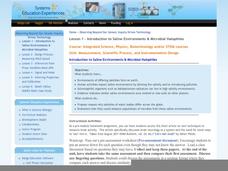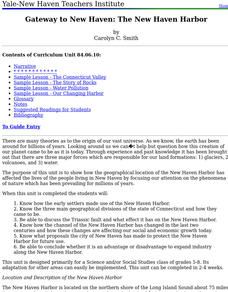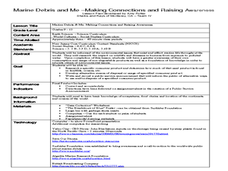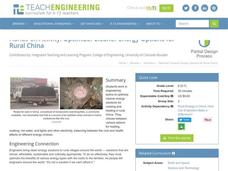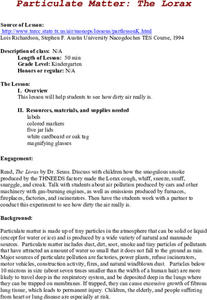Curated OER
Editorial Writing
Use your class's knowledge of pollution and water treatment to write an editorial to town citizens. They apply prior knowledge in order to compose a letter intended for newspaper publication, focusing on writing to an appropriate audience.
Institute for Systems Biology
Introduction to Saline Environments & Microbial Halophiles
If you do not mind wading through unrelated headings (This is not for a physics or STEM course, as it states.) and content (The lesson opens with an article about neurology, not halophiles.), then you will find a valuable resource on...
Curated OER
The Urban Heat Island Effect - Lesson 2 (Grades 8-9)
Students use the scientific process to show that when various surfaces are exposed to similar environmental conditions, surface temperatures may vary. They examine the "urban heat island" phenomenon and analyze why it increases energy...
Curated OER
Language Arts: How Can Research Shape Ideas?
Students are able to characterize arsenic and determine its potential health threats in writing. They are able to compare and contrast arsenic to other water pollutants using Venn diagrams. Students are able to demonstrate essay skills...
Curated OER
Identifying Wetlands
Young scholars describe three major categories of indicators that are used to delineate wetlands. In this wetlands lesson students visit a wetland and make observations then complete an activity using the soil.
Curated OER
Environmental Responsibility
Young scholars discuss the importance of recycling and preventing pollution. In groups, they complete mini-studies on various environmental issues and evaluate different consumer products. They use global warming data to determine the...
Curated OER
Oil Spill Cleanup
Students participate in an oil spill simulation and how to clean it up. In this oil spill lesson plan, students also calculate the cost of the clean up of an oil spill.
Curated OER
My Hometown
Learners identify the basic requirements needed for survival and identify the resouces needed for survival that are found within their own community. They use craft materials to create a model of it and then. create a color key to...
Curated OER
Organic and Inorganic Recycling
Students examine their role in polluting the environment and discuss the importance of recycling. In groups, they place earthworms into compost piles to observe why they are considered natural recyclers. They also practice sorting a...
Curated OER
Gateway to New Haven: The New Haven Harbor
Students study how the geographical location of the New Haven Harbor has affected the lives of the people living in New Haven by focusing our attention on the phenomena of nature which has been prevailing for millions of years in this...
Curated OER
Rivers for the Common Good
Students explore what effects improper waste disposal and water pollution have on the water cycle. They explore how philanthropic acts can help protect the water cycle and keep our water and planet clean.
Curated OER
Losing An Island
Students examine carbon dioxide and determine the impact of greenhouse gases on the earths spheres. In this pollution lesson students complete a lab activity to see the impact of gases on the environment,
Curated OER
Environment: Just Around the Bend
Students decipher landforms on a map and corresponding satellite imagery. They consider the impact of pollution on agriculture and water. They draw diagrams demonstrating how pollution works its way into the food source.
Curated OER
Platypus in Crisis
Students learn about the Australian Minister of Fisheries and Wildlife and platypus as an endangered species. In this endangered species instructional activity, student role play as the Australian Minister of Fisheries and Wildlife to...
Curated OER
Rain Forest Rally
Eighth graders study tropical and temperate rainforests. In this rainforest lesson students complete a lab activity using the Internet.
Curated OER
Marine Debris and Me
Students study the environmental issues that pertain to the marine environment. In this research ocean landfills lesson students come up with alternative means of disposal.
Curated OER
Better English Lessons: Fishy Birds
In this online interactive English skills worksheet, students respond to 20 multiple choice questions that require them to select the appropriate words to complete the sentences. Answers are scored immediately.
Teach Engineering
Chromatography Lab
Groups use alcohol and chromatography paper to separate the color components of black ink. The purpose of the activity is to allow the class to become aware that mixtures exist in hidden places.
Teach Engineering
Optimize! Cleaner Energy Options for Rural China
What are the trade-offs when looking to get the most benefit from an energy source? Small groups compare the cost-to-emission levels of several energy sources by looking at the information graphically. The groups utilize this information...
Teach Engineering
Biological Processes: Putting Microbes to Work
Is there such a thing as useful microbes? Get ready to perform experiments on applying microbes for wastewater treatment. The first installment of the three-part unit provides background information to prepare young engineers for two...
Curated OER
The Chesapeake Bay in Captain John Smith's Time
When Captain John Smith visited the Chesapeake Bay in the summer of 1608, what types of animals and habitats did he encounter? Your young historians will analyze primary source documents to answer this question, as well as compare the...
Curated OER
Particulate Matter: The Lorax
Students investigate how dirty air is outside. They read and discuss the book, The Lorax, by Dr. Seuss. They investigate using jars and lids to compare the dirt left each day as they remove the lids. They observe the lids and discuss if...
Curated OER
Mud in the Water
Students build a soil erosion model to study the importance of soil conservation. They investigate how land forms from both constructive and destructive forces.
Curated OER
Oily Oceans
Students, after reading Jack, the Seal and the Sea, by Gerald Aschenbrenner, get a hands-on knowledge of the effects of oil on water, and those things that come in contact with it.



